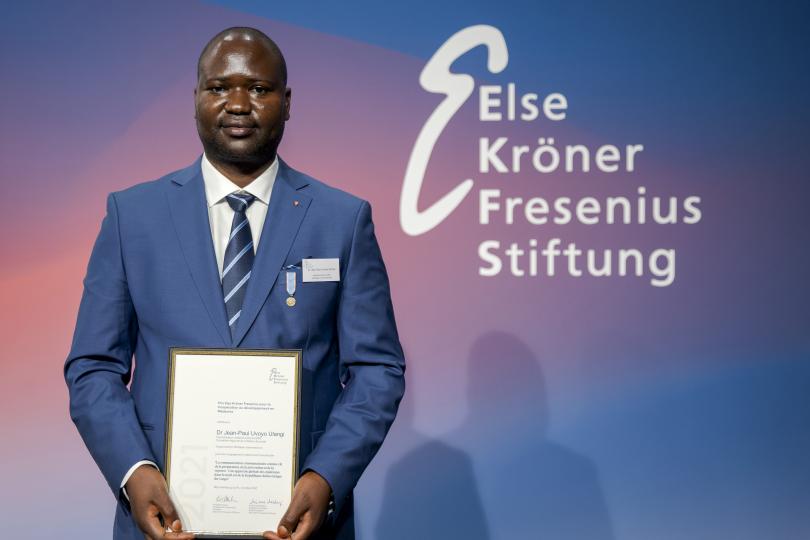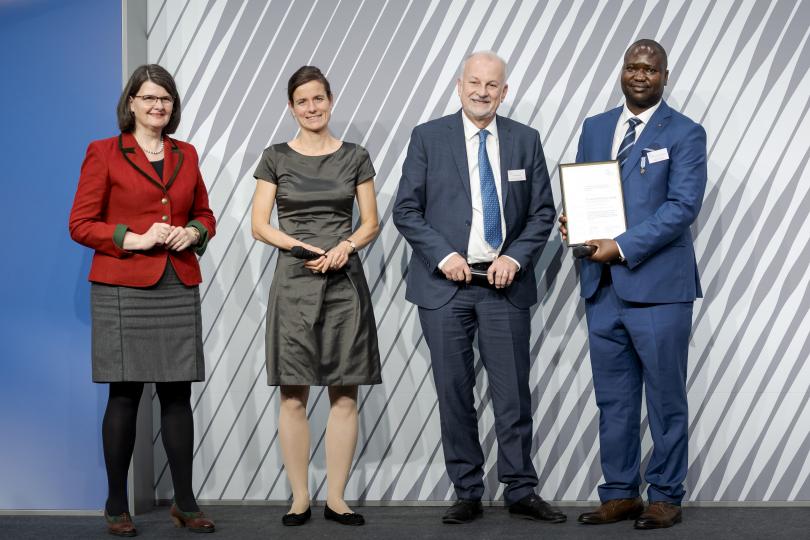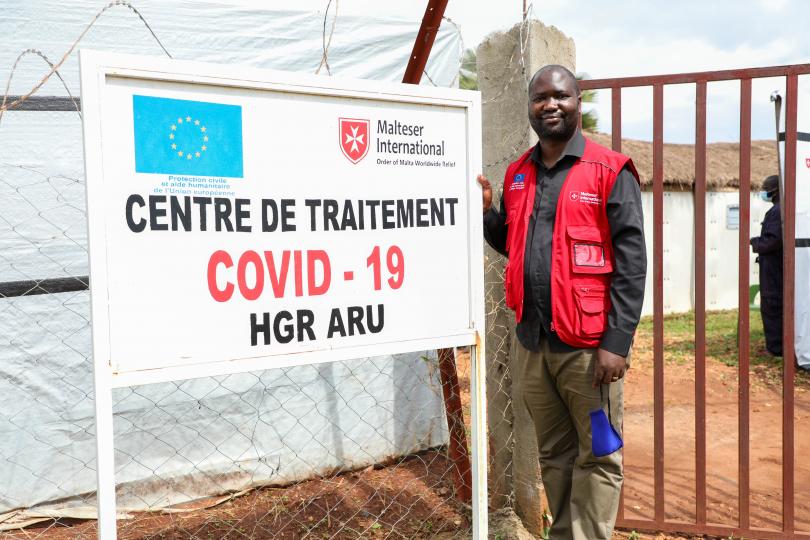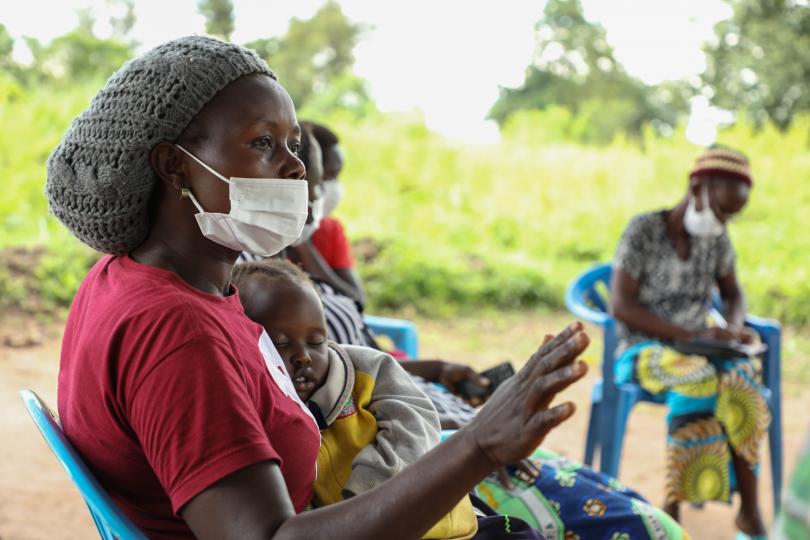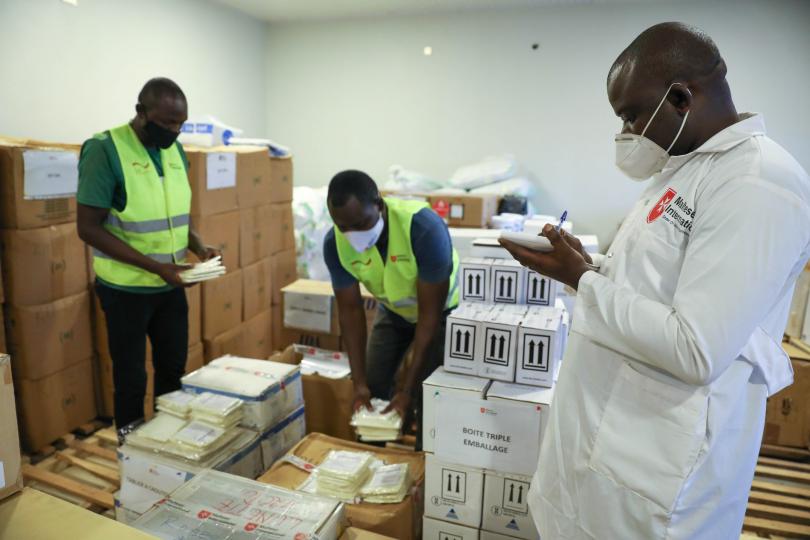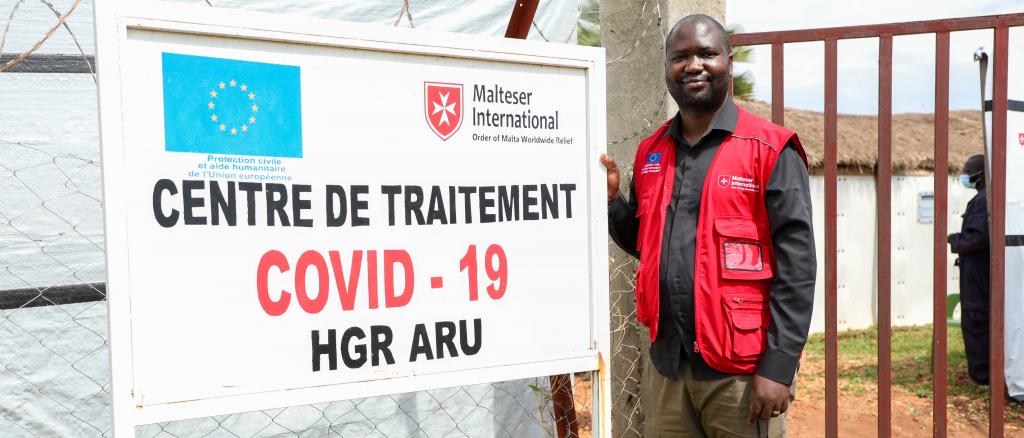
Bad Homburg v.d. Höhe, October 29, 2021 – On October 28th Malteser International received the renowned Else Kröner Fresenius Award for Development Cooperation in Medicine 2021 on the topic of “Epidemic Preparedness and Response”. At 100,000 euros, it is one of the most important and best-endowed awards in the field of development cooperation. The digital award ceremony held by the foundation Else Kröner-Fresenius-Stiftung (EKFS) was broadcast live from the German Federal Ministry for Economic Cooperation and Development (“BMZ”) in Berlin.
The focus of this year’s award-winning project lies on the combating of numerous well-known infectious diseases that can cause epidemics – for example acute meningitis, the plague, polio, malaria or Ebola. “With the presentation of its humanitarian award EKFS honors a project that is comprehensively scaled and can be applied to any epidemic in any region,” explains Dr. Judith von Heusinger, in charge of medical-humanitarian funding at EKFS.
Dr. Jean-Paul Uvoyo Ulangi, Country Medical Coordinator of the DRC and Regional Health Advisor, received the award from Dr. Dieter Schenk, Chairman of the Foundation Board of EKFS – in the presence of PD Dr. Carolin Kröner, Member of the Foundation Board, and Dr. Maria Flachsbarth, Parlamentary State Secretary, German Federal Ministry for Economic Cooperation and Development (“BMZ”). The 44-year-old award-winner has been working for Malteser International for 10 years. “We bank on an efficient, community-based approach. The targeted objective is to reduce the frequency of illnesses along with mortality in the event of epidemics, and to curtail the spreading of the pathogens involved,” explains Dr. Uvoyo Ulangi.
The money from the EKFS award is intended to be used to reinforce the resiliency of the healthcare system in preparing for and responding to epidemics. The extensive strengthening of local communities and the healthcare system is supposed to be supplemented through the “One Health” approach. This approach broadens the focus to include the health of animals and the environment. The goal is to improve the prevention and response to zoonotic and environmental diseases such as the plague or rabies.
Integrate and involve: centers on the local population
Malteser International established the project “Community communication as key for Preparedness, Prevention and Response” in the provinces of Ituri and Haut-Uélé in 2018 to be able to respond to different epidemics rapidly and successfully.
The focus is placed on integrating the local population. With P-FIM – the people first impact method, a participatory approach – the people obtain a say and can join in designing the measures toward preventing and combating pandemics. In the case of this community-based approach the people’s needs are assessed and messages are developed jointly with them. Their purpose is to inform the population door-to-door and via radio, flyer or poster about potential paths of infection and contagion processes, and to gain the population’s trust.
The second pillar is an efficient early warning system that equally banks on communication and networking within the village community. In addition, preparedness, prevention and treatment are further key pillars to slow down or avert the outbreak of epidemics. The project region encompasses seven health zones, each of which has a member hospital and several health centers. The health zones have developed contingency plans and have been equipped with emergency stocks for immediate response in the event of an outbreak of an epidemic. The proper case management of a suspected case or a patient who has actually gotten sick is fundamentally important.
Long term and continuous: involvement in pandemic prevention
Malteser International has been engaged in the prevention and combating of pandemics in the DR Congo since 1996. “The healthcare structures here are still very weak, the people only have meager financial resources. As a result, epidemics can spread very rapidly and the healthcare system can be very quickly overwhelmed,” notes Johannes Schildknecht, International Program Manager for the DR Congo at Malteser International. From 2018 to 2020 the region in the northeast of the country struggled with the world’s second-largest outbreak of Ebola. Since 2019 the worst epidemic of measles worldwide has held sway in the Congo. Equally present are the bubonic plague, monkey pox, yellow fever, West Nile fever, malaria and meningitis. Close interactions between human beings and animals are a frequent cause for diseases in the region.
Else Kröner Fresenius Award
The Else Kröner Fresenius Award for Development Cooperation in Medicine is presented once a year for particular achievements in the field of development cooperation. Projects worldwide which serve in an outstanding manner toward improving healthcare are acknowledged. The award-winners’ money is utilized directly for the projects. Each year the announcement of the humanitarian award pertains to a different thematic emphasis.
This project was presented during the World Health Summit: https://youtu.be/giSOj26FB5U
Do you want to learn more about the award winner Dr. Jean-Paul Uvoyo Ulangi? Then read our interview.
Else Kröner-Fresenius-Stiftung (EKFS) – Advancing research. Helping people.
The Else Kröner-Fresenius-Stiftung, a non-profit foundation, is dedicated to the funding of medical research and supports medical-humanitarian projects. To date the foundation has funded around 2,200 projects. With a current annual funding volume of over 60 million euros, EKFS is the largest foundation funding medicine in Germany. You can find more information at: www.ekfs.de/en
Press Contact
Else Kröner-Fresenius-Stiftung
Bianka Jerke
Tel.: + 49 6172 8975-24
eMail: b.jerke@ekfs.de
Malteser International
Malteser International is the worldwide relief agency of the Sovereign Order of Malta for humanitarian aid. The organisation provides aid to people in need in around 100 projects in 30 countries, regardless of their religion, origin or political convictions. Christian values and the humanitarian principles of impartiality and independence form the basis of its work. Further information: www.malteser-international.org
Press Contact
Malteser International
Katharina Kiecol
Tel.: +49 221 96441 181
eMail: katharina.kiecol@malteser-international.org
